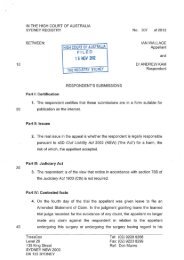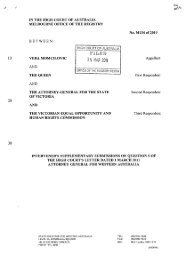Written submissions - High Court of Australia
Written submissions - High Court of Australia
Written submissions - High Court of Australia
You also want an ePaper? Increase the reach of your titles
YUMPU automatically turns print PDFs into web optimized ePapers that Google loves.
13<br />
no longer to be regarded as potentially requiring a judge exercising the judicial power <strong>of</strong><br />
the State <strong>of</strong> Victoria to have regard to lesser penalties for like Conunonwealth <strong>of</strong>fences<br />
and instead is to be confined to less punitive <strong>of</strong>fences that exist within the jurisdiction in<br />
which the judicial power is being exercised. 36 Further, even if the principle is not to apply<br />
generally to comparisons with less punitive Conunonwealth <strong>of</strong>fences, it was applicable in<br />
this particular case. There are several reasons:<br />
35. Mutual sovereigntv: First, it is submitted that the reasoning <strong>of</strong> Winneke P in R v Liang<br />
& Lr- concerning the relevance <strong>of</strong> the Conunonwealth's view as to the appropriate<br />
10 sentencing tariff for <strong>of</strong>fending perpetrated against its interests - and the underlying<br />
rationale for the principle as explained by Redlich JA in R v McEachren 38 - concerning<br />
fairness and consistency in sentencing- are consistent with the fact that <strong>Australia</strong>n<br />
citizens are subject simultaneously to both Conunonwealth and State laws. In shoJi,<br />
Conunonwealth and State laws have "mutual sovereignty" over citizens <strong>of</strong> the<br />
Conunonwealth. 39 Not only must citizens obey both "sovereigns" but, if they do not, then<br />
- and depending upon the proscribed conduct- they may be exposed to penal<br />
consequences for the same conduct from a Conunonwealth, State or Conunonwealth/State<br />
prosecution.<br />
20 36. Consistency in punishment and equal justice: Secondly, in Green v The Queen (2011)<br />
244 CLR 462 at [28], French CJ, Crennan and K.iefel JJ made the following remarks about<br />
notions <strong>of</strong> equal justice and consistency in sentencing:<br />
30<br />
"Equal justice" embodies the norm expressed in the term "equality before the law". It is<br />
an aspect <strong>of</strong> the rule <strong>of</strong> law. It was characterised by Kelsen as "the principle <strong>of</strong> legality, <strong>of</strong><br />
lawfulness, which is immanent in every legal order". It has been called "the starting point<br />
<strong>of</strong> all other liberties". It applies to the interpretation <strong>of</strong> statutes and thereby to the exercise<br />
<strong>of</strong> statutory powers. It requires, so far as the law permits, that like cases be treated alike.<br />
Equal justice according to law also requires, where the law permits, differential treatment<br />
<strong>of</strong> persons according to differences between them relevant to the scope, purpose and<br />
subject matter <strong>of</strong> the law. As Gaudron, Gummow and Hayne JJ said in Wong v The<br />
Queen:<br />
"Equal justice requires identity <strong>of</strong> outcome in cases that are relevantly<br />
identical. It requires different outcomes in cases that are different in some<br />
relevant respect." (Emphasis in original.)<br />
36<br />
Pantazis & Ors v The Queen [2012] VSCA !60 at [3]-[6] (summary <strong>of</strong> issue and conclusion) and [27]-[62] &<br />
[93] (analysis <strong>of</strong> issues and reasons for conclusions).<br />
37<br />
R v Liang & Li (1995) 82 A Crim R 39 at 43.<br />
38<br />
R v McEachren (2006) 15 VR 615 at [55].<br />
39<br />
Contrast "dual sovereignty" in the United States context, which is recognized as an exception to the<br />
prohibition against double jeopardy. It recognises that two sovereigns <strong>of</strong>ten have separate and legitimate<br />
interests in prosecuting an accused.
















